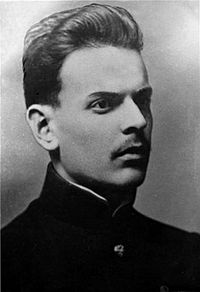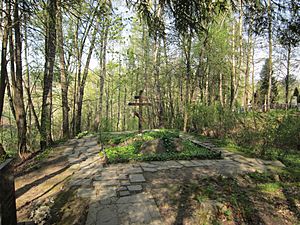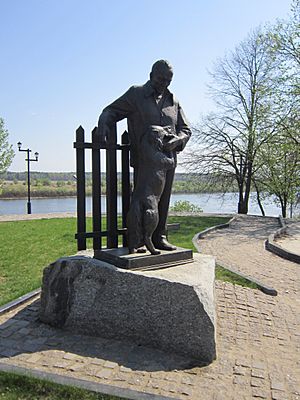Konstantin Paustovsky facts for kids
Quick facts for kids
Konstantin Paustovsky
|
|
|---|---|
 |
|
| Born | Konstantin Georgiyevich Paustovsky 31 May 1892 Moscow, Russian Empire |
| Died | 14 July 1968 (aged 76) Moscow, Soviet Union |
| Signature | |
 |
|
Konstantin Georgiyevich Paustovsky (Russian: Константи́н Гео́ргиевич Паусто́вский; 31 May 1892 – 14 July 1968) was a famous Soviet writer. He was even nominated for the Nobel Prize for literature in 1965.
Contents
Konstantin Paustovsky's Early Life
Konstantin Paustovsky was born in Moscow. His father worked with railroads and was a dreamer. His mother came from a Polish family of educated people. Konstantin's family had roots from different backgrounds, including Zaporozhian Cossack, Turkish, and Polish.
Konstantin grew up in the Russian Empire. He spent time both in the countryside and in Kyiv. He went to a classical school called a Gymnasium in Kyiv. There, he was classmates with another famous writer, Mikhail Bulgakov. When he was in 6th grade, his father left the family. Konstantin had to give private lessons to earn money.
In 1912, he started studying natural history at the University of Kyiv. In 1914, he moved to study law at the University of Moscow. However, World War I stopped his studies.
During the war, he first worked as a trolley driver in Moscow. Then, he became a paramedic on a hospital train. In 1915, his medical group had to retreat through Poland and Belarus. After his two brothers died in the war, he went back to his mother in Moscow. But he soon left again and traveled around. He tried many different jobs. He worked in metal factories in Yekaterinoslav (now Dnipro, Ukraine) and Yuzovka (now Donetsk, Ukraine). In 1916, he lived in Taganrog. He worked at the Taganrog Boiler Factory there.
Later, he joined a group of fishermen in Taganrog. This is where he started writing his first novel, Romantiki (Romantics). It was published in 1935. The book was about what he saw and felt when he was young. It described the life of an artist who tried to overcome being lonely. He wrote about his experiences in Taganrog in other works too. These included Conversation about the Fish and Seaport in The Grass.
Paustovsky's Novels and Poetry
Paustovsky started writing when he was still in school. At first, he wrote poetry. But a famous writer, Ivan Bunin, told him that his true talent was in writing prose (stories). So, he focused on writing stories. His first stories, “On The Water” and “The Four,” were published in 1911 and 1912. During World War I, he wrote short pieces about life at the front.
His first book, Sea Sketches, came out in 1925. It didn't get much attention. He then wrote Minetoza in 1927 and Shining Clouds in 1929. Other writers like Alexander Grin and the "Odessa school" writers influenced his work during this time.
In the 1930s, Paustovsky visited many construction sites. He wrote about how the country was changing with new industries. His novels Kara-Bugaz (1932) and Kolkhida (1934) are from this period. Kara-Bugaz was especially praised. It's an adventure story about exploring the Kara-Bugaz Bay area. It tells of Red Guards who get stranded on a lonely island. Some survive and help explore the area's natural resources.
Paustovsky also wrote historical stories. One example is Tale of the North (1938). This story is about a wounded officer and a sailor. They try to escape across the ice to Sweden after an uprising against the Tsar. Years later, their great-grandchildren meet in Leningrad.
In the late 1930s, Russian nature became a main topic for Paustovsky. He wrote Summer Days (1937) and Meshcherskaya Storona (1939). In these books, he showed nature as a beautiful place. He believed it could help people relax and feel better. Because of this, people compared his writing to Mikhail Prishvin. Prishvin himself said, "If I were not Prishvin, I would like to write like Paustovsky."
During World War II, Paustovsky worked as a war correspondent on the southern front. In 1943, he wrote a movie script for "Lermontov". Another important work is Tale of the Woods (1948). This story starts in the 1890s. The composer Pyotr Ilyich Tchaikovsky is writing music in a forest. A young girl brings him berries. Fifty years later, that girl's daughter works in the same forest.
From 1948 to 1955, Paustovsky taught at the Maxim Gorky Literature Institute. He also edited books like Literary Moscow (1956). He tried to help new writers become known. He also helped writers who were not allowed to publish during the time of Joseph Stalin.
Other major works include Snow, Crossing Ships (1928), The Black Sea (1936), and The Rainy Dawn (1946). Paustovsky also wrote several plays and fairy tales. These include "Steel Ring" and "The Golden Rose" (1955). In "The Golden Rose," he wrote about how writers create their stories.
Paustovsky's Autobiography
Perhaps Paustovsky's most famous work is his autobiography, Povest o Zhizni (Story of a Life). It's not just a list of facts. It's a long, poetic story about his feelings and how he grew as a writer. Some people call it a "biography of the soul." Still, it gives a special look at life in Russia during difficult times. These included World War I, the Russian Civil War, and the start of the Soviet Union. Paustovsky was part of all these events.
Nobel Prize Nomination
In 1965, Paustovsky was nominated for a Nobel Prize for literature. However, the prize was given to Mikhail Sholokhov instead.
In February 1966, he was one of 25 important people from science and art. They signed a letter to the Communist Party of the Soviet Union. They asked the Party not to bring back strict rules like those under Stalin. This happened after a trial known as the Sinyavsky-Daniel trial.
Konstantin Paustovsky died in Moscow on 14 July 1968.
Paustovsky's Quotes
- Waiting for happy days is sometimes much better than those days themselves.
- A person must be smart, humble, fair, brave, and kind. Only then can they truly be called a person.
- Let's not talk about love. We still don't know what it is.
- If we take away a person's ability to dream, one of the biggest reasons for culture, art, science, and wanting a beautiful future will disappear.
- From a dream book: if a poet dreams his money is running out, it means new poetry is coming.
- Savrasov painted The Rooks Have Come Back quickly. He was afraid the rooks would fly away.
- The favorite topic of Chekhov: There was a wonderful, healthy forest. A forester was hired to take care of it. The forest quickly withered and died.
- Hard work is also a talent. Some writers should be photographed from behind, not from the front.
- Turgenev didn't have the good health of Leo Tolstoy or the struggles of Dostoevsky.
- I believe that writing comes from imagination and memories. That's why I never use notebooks. If you take a sentence from your notes and put it into a story you're writing later, it loses its life. I only see notebooks as a type of writing themselves.
See also
 In Spanish: Konstantín Paustovski para niños
In Spanish: Konstantín Paustovski para niños
 | Sharif Bey |
 | Hale Woodruff |
 | Richmond Barthé |
 | Purvis Young |



